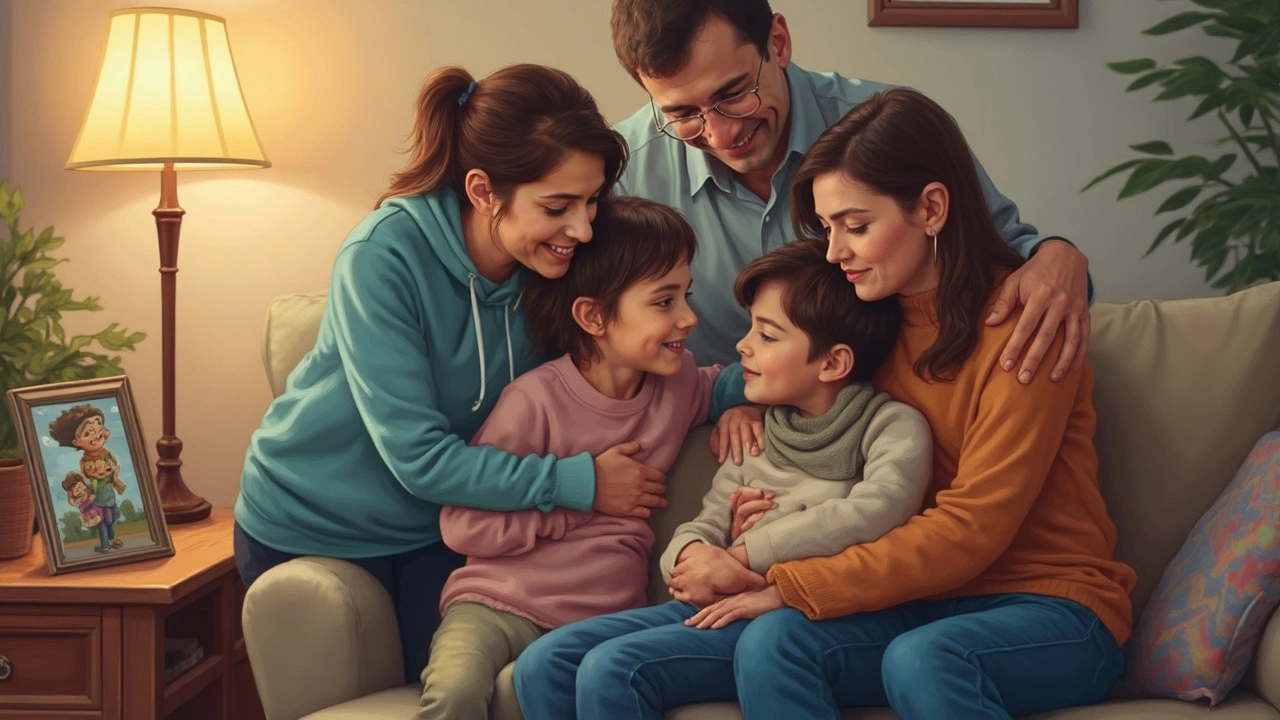Let's get one thing straight right off the bat: palliative care isn't just about end-of-life scenarios. For those dealing with chromosome-positive lymphoblastic leukemia, it's a game-changer no matter where you are on your medical journey. It's not about giving up. It's about enhancing quality of life and managing symptoms effectively.
Imagine facing the day-to-day challenges of leukemia and having a team dedicated to making everything more manageable. Think of them as your support crew, there to lighten the load. This isn't just medical support; it's emotional and psychological, too. Got pain, nausea, or fatigue? Palliative care teams are pros at tackling these head-on, so you can focus on what matters to you.
This care approach isn't stuck in one lane—it works alongside curative treatments. So while your doctors are aiming to beat the leukemia, your palliative care team is ensuring you're as comfortable and supported as possible. Not only does this boost your quality of life, but it can also positively impact your overall treatment experience.
- Understanding Palliative Care
- Symptoms Management in Leukemia
- Emotional Support and Therapy
- Integration with Medical Treatment
- Common Misconceptions and FAQs
Understanding Palliative Care
When it comes to managing something as challenging as chromosome-positive lymphoblastic leukemia, palliative care might just be the unsung hero. So, what is it exactly? In simple terms, it's specialized medical care focused on providing relief from the symptoms and stress of a serious illness. This type of care is designed to improve the quality of life for both the patient and their family.
Contrary to some misconceptions, palliative care isn't just for those nearing the end of life; it can be included at any stage of the illness. It's all about complementing existing treatments by addressing emotional, physical, and psychological needs. You don't have to wait for a terminal diagnosis to reap its benefits.
Key Elements of Palliative Care
There are several core components to effective palliative care that you and your support team can expect:
- Symptom Management: This is priority number one. From pain relief to tackling pesky side effects like nausea or insomnia, the focus is to make you comfortable.
- Holistic Support: Think of this as comprehensive care that takes care of the whole person, not just the disease. Mental health support, spiritual counseling, and even social services can be a part of it.
- Communication: Palliative care involves clear communication with doctors, specialists, and family to make informed decisions about treatment options and care goals.
- Coordination: Seamlessly integrating into your current treatment, the palliative team works alongside your other healthcare providers to ensure consistent and comprehensive support.
In a study by the American Society of Clinical Oncology, early integration of palliative care showed improved quality of life and even extended life in patients undergoing cancer treatments. This underlines its importance not as an add-on but as a necessary component of comprehensive care.
If you're considering it, remember it isn't an admission of defeat. Instead, it's about fighting smarter, reducing suffering, and maintaining dignity and quality during a difficult journey.
Symptoms Management in Leukemia
Dealing with chromosome-positive lymphoblastic leukemia is a bit like riding a rollercoaster. The symptoms can be unpredictable and intense, making symptom management a key focus. It's not just about medical interventions but finding ways to make everyday life more comfortable.
Pain and Discomfort
Nobody likes to be in pain, right? With leukemia, pain could be from the disease itself or side effects of treatments. Palliative care steps up by providing pain management strategies. Doctors typically recommend a mix of medications, physical therapy, and lifestyle changes to manage discomfort effectively. Opioids might be used, but under careful monitoring to avoid dependency.
Managing Fatigue
Fatigue feels like an unwanted houseguest—persistent and draining. It’s more than just being tired. Techniques for handling this might include tailored exercise regimens, dietary tweaks, and mindfulness or yoga to help boost energy levels. Breaking activities into manageable tasks can also help to conserve limited energy.
Nausea and Appetite Loss
If leukemia treatments are causing nausea, it's critical to tackle that head-on. Anti-nausea medication can be a lifesaver here. It's also helpful to eat smaller, more frequent meals rather than big sit-downs. Trying out new flavors and textures can sometimes combat the monotony of limited diets. Personalized nutrition advice can be invaluable in restoring appetite and maintaining weight.
Emotional and Psychological Support
Let's not forget how crucial mental health is in all of this. Anxiety and depression often tag along with a leukemia diagnosis. Having someone to talk to, whether a counselor or support group, can be extremely beneficial. Techniques like cognitive-behavioral therapy (CBT) can also help manage emotional stress.
Effective symptom management in chromosome-positive lymphoblastic leukemia isn’t one-size-fits-all. It's about finding what works best for you and rolling with it. By focusing on these strategies, you're not just surviving but living as comfortably as possible.

Emotional Support and Therapy
Dealing with chromosome-positive lymphoblastic leukemia isn't just a physical struggle; it's an emotional rollercoaster, too. That's why having the right emotional support and therapy is crucial. It can genuinely make a difference in how patients and their families cope with the realities of cancer.
Why Emotional Support Matters
For starters, a diagnosis like leukemia can bring a lot of stress, anxiety, and even depression. This emotional burden can affect not only the patient but also their loved ones. By having access to emotional support, individuals can get guidance and strategies to help manage their mental health. This support often includes counseling that offers a safe space to express feelings. It's okay not to have it all together, and talking it out can be a huge relief.
Types of Emotional Support
- Individual Counseling: One-on-one sessions with a therapist can help personalize coping strategies and allow patients to process their feelings privately.
- Group Therapy: Joining a group of people facing similar challenges can create a sense of community and shared understanding. It’s a reminder that you’re not alone in this journey.
- Family Therapy: Sometimes, the whole family needs support. This can help improve communication and reduce tensions, ensuring everyone is on the same page.
The Role of Therapies
Different therapies can assist in boosting the emotional well-being of patients. Mindfulness and meditation, for example, are gaining traction as effective tools to reduce stress and improve mental clarity. Art and music therapies are also popular for expressing emotions when words fall short. They offer a creative outlet for emotions that might otherwise be difficult to express.
With emotional health being such a critical component of holistic leukemia care, more attention is being directed toward palliative programs that integrate emotional support comprehensively. It's not just an add-on; it's an essential piece of the puzzle in managing life with leukemia.
Integration with Medical Treatment
People often wonder how palliative care fits with ongoing medical treatments for chromosome-positive lymphoblastic leukemia. Think of it as a partnership. While your primary doctors focus on eradicating cancer with chemotherapy or targeted therapies, the palliative team zooms in on improving quality of life. It's a tag-team approach that addresses not just the disease, but the whole person.
A big plus is the attention to side effects. Treatments like chemo can come with a host of unpleasant gifts—nausea, fatigue, you name it. Palliative care specialists are kind of like symptom detectives. They're all about finding ways to minimize these side effects so you're not dealing with more than you have to.
Coordinated Care Plan
When you sign up for palliative support, you're getting a coordinated care plan. This isn't a one-size-fits-all approach. Your team will work closely with your oncologists and other healthcare providers to sync up your treatment plans. It’s all about getting everyone on the same page to tailor strategies just for you.
- Regular team meetings ensure everyone is informed about your current status.
- Adjustments to symptom management plans can happen swiftly as your needs change.
- Constant communication keeps you in the loop, so there are no surprises along the way.
Proactive Symptom Management
One standout benefit is the proactive nature of palliative care. These folks don't wait for things to get bad before they act. They’re there actively monitoring and making tweaks as needed. Have headaches from your treatments? They'll sort out resources and solutions to make it less of a pain—literally and figuratively.
Sometimes, palliative care can indirectly boost even the effects of primary treatments. When you're not worn out by pain or discomfort, you're in a better position to respond to your medical treatment, improving overall outcomes.
Statistics at a Glance
Here's a fun nugget for you: Studies have shown that patients receiving integrated palliative care during cancer treatments report higher satisfaction and even potentially better survival outcomes.
| Aspect | Impact |
|---|---|
| Symptom Relief | Improved |
| Quality of Life | Enhanced |
| Treatment Satisfaction | Higher |
So there you have it. Integrating palliative care with your leukemia treatment plan isn't just about dealing with negatives—it's about maximizing positives, both in body and spirit. It's a holistic strategy that's revolutionizing how we support cancer patients.

Common Misconceptions and FAQs
When it comes to palliative care in the realm of chromosome-positive lymphoblastic leukemia, there are a bunch of myths floating around. Clearing these up can help alleviate some worries you might have. Let's dive into a few of these misunderstandings.
Misconception #1: Palliative Care Means Giving Up
This is probably the most common misconception. Many think that once you opt for palliative care, you've thrown in the towel. Not true! Palliative care works alongside other treatments. It's not about stopping the fight but rather making life better during the battle. It focuses on symptom management, not giving up on recovery goals.
Misconception #2: It's Only for the Final Stages
Another biggie! People often believe palliative care is reserved for those in their last days. Actually, it's beneficial from the moment of diagnosis. The aim is to provide relief from symptoms and stress, and the earlier the support begins, the better it can improve the quality of life.
FAQ: Can You Keep Your Current Doctor?
Yes, you absolutely can. Your palliative care team works in tandem with your existing medical crew. It’s a team effort, with everybody on the same page to give you the best care possible.
FAQ: Does Palliative Care Cover Emotional and Mental Support?
Absolutely! It goes beyond just physical symptoms. Your emotional and mental well-being are crucial too. Whether it’s counseling, support groups, or therapy, addressing these areas is a key component.
Quick Stats on Palliative Care Benefits
| Benefit | Percentage of Patients Reporting Improvement |
|---|---|
| Symptom Relief | 70% |
| Quality of Life | 65% |
| Emotional Support | 75% |


John Blas
July 17, 2025 AT 23:22Honestly, the whole concept of palliative care often feels like you're just waiting for the worst to happen, right? Like, people usually imagine it as a last stop rather than a support system throughout the journey. It's kind of dramatic how this perception can overshadow the real benefits.
But reading this, I get that it’s way more than that. It’s interesting how symptom management and emotional support are highlighted as continuous rather than final-stage-only interventions. Makes me wonder why more people aren't talking about this early on.
It’s almost lazy to assume palliative care is just about giving up. Instead, it sounds like a proactive way to enhance life quality alongside treatments. Anyone else feel like this needs way more awareness?
SHIVA DALAI
July 19, 2025 AT 00:05This article eloquently dispels common misconceptions regarding palliative care in chromosome-positive lymphoblastic leukemia. Indeed, the provision of symptom management and psychological support at various stages can profoundly influence patient wellbeing.
It is regrettable that many associate palliative care solely with terminal phases, thus depriving patients and families of much-needed holistic support earlier on. The integration of comfort measures alongside active treatment embodies the true essence of comprehensive care.
Educating medical professionals and the public alike about these nuances remains an essential task. I deeply appreciate the effort to highlight practical approaches which navigate this complex journey with dignity and empathy.
Vandita Shukla
July 20, 2025 AT 01:05While I acknowledge the importance of palliative care at all illness stages, it’s crucial to emphasize its multidisciplinary nature. Beyond symptom control, there's nutritional guidance, physical therapy, and even spiritual counseling involved.
Many patients and their families may not realize these provisions fall under palliative care, mistakenly segregating services. This fragmented understanding can lead to underutilization of available supportive measures.
Moreover, it’s imperative that healthcare providers clearly articulate these options early, mitigating misinformation. Have any of you encountered situations where palliative care was erroneously delayed due to misconceptions?
Luke Dillon
July 21, 2025 AT 02:22This topic hits close to home for me because I have a friend going through similar treatment. It's reassuring to see articles explain that palliative care isn't just for the bleak end but can really improve day-to-day life even while fighting this disease.
Providing comfort and help with symptoms without giving up on active treatment feels like the best balance. I've seen how emotional support can uplift someone's spirit during tough times, and that's a vital part of care that tends to be overlooked.
We need more conversations like this to reduce that stigma and confusion surrounding palliative services. Knowledge truly empowers patients and families.
Jeremy Wessel
July 22, 2025 AT 00:52Palliative care in chromosome-positive lymphoblastic leukemia challenges the reductive notion that care equals cure or die. Truly, care sustains life quality regardless of prognosis.
The philosophical pivot here is appreciating care as a continuum, integrating comfort without surrender. This reframing shifts power back to patients, offering dignity and agency.
The insights from this article underscore the practical and ethical dimensions of such care. It’s both a science and a compassionate art that demands broader acceptance within clinical practice and society.
Laura Barney
July 22, 2025 AT 23:22I must say, the wording here helps untangle such a complicated topic beautifully. It’s like shining a colorful light into a dark, misunderstood corner of cancer care.
We often underestimate how emotional and physical symptom management weave together to create a feeling of peace and hope for patients. This article highlights that essence wonderfully.
I'm curious to see how these insights will influence public perception and, more importantly, how care protocols evolve to embrace these principles fully.
Jessica H.
July 23, 2025 AT 21:52Really, I think the biggest barrier is how people emotionally resist labeling anything as 'palliative' even when it could be beneficial early on. The stigma is so ingrained that it blinds families from seeking this valuable support.
The clinical community must do more to dismantle this resistance by educating patients with clarity and empathy. Articles like this help, but we need widespread systemic change.
It’s exhausting watching good intentions fail because of misconceptions and fear. Has anyone here witnessed a positive turnaround when palliative care was introduced early?
Tom Saa
July 24, 2025 AT 20:22Managed suffering is still suffering, yet palliative care aims to make this suffering bearable, even meaningful in some twisted fashion. I’m not sold on the optimism this article radiates. Life and death cycle through a tapestry of absurdities, and palliation feels like an appeasement.
Still, I guess if it provides relief, it could be a soft cushion to the harsh fall. But people should be honest about the emotional toll and not sanitizing these journeys with euphemisms.
Does anyone else get bothered by how clinical language sometimes obscures the raw reality patients face?
John Magnus
July 25, 2025 AT 18:52Addressing palliative care through a clinical lens, especially in chromosome-positive lymphoblastic leukemia, demands vigilance about timing and modality. Early integration with chemotherapy protocols can ameliorate symptom burden and enhance compliance.
From a therapeutic standpoint, symptom palliation and psychosocial interventions must be tailored dynamically to disease kinetics and patient response. Metrics such as ECOG performance status and symptom scales can guide adjustments efficiently.
Importantly, educating oncologists to overcome their therapeutic nihilism regarding palliation remains an ongoing challenge, necessitating structured training and interdisciplinary collaboration.
Marc Clarke
July 26, 2025 AT 17:22What I love about this conversation is how it blends the clinical and human elements effortlessly. It’s a tough balance but so important.
I feel optimistic that as more patients share their stories, the fog of misunderstanding around palliative care will clear. Real talk from those affected can be this gentle nudge towards wider acceptance and better care practices.
Hope this thread keeps growing with more lived experiences and practical advice. It’s a beacon of hope amid tough realities.
angelica maria villadiego españa
July 27, 2025 AT 15:52Reading all these perspectives really broadens my understanding. The emotional support aspect especially resonates with me because it complements medical interventions so well.
It’s essential patients feel heard and supported psychologically as they navigate treatment. Without this, even the best medical care can fall short in truly improving life quality.
I’m thankful this post and the comments are dismantling myths and encouraging empathy. It feels like a step toward holistic healing.
SHIVA DALAI
August 3, 2025 AT 10:05Thank you all for your insightful contributions. It reaffirms the necessity of viewing palliative care as an integral component of cancer management from the outset, not merely an end-of-life option.
This evolving understanding demands greater advocacy and dissemination within both professional circles and the wider public to equip patients with comprehensive care choices.
Let us continue to promote strategies that marry symptom control with emotional resilience. Only then can we transform the patient journey from one of isolation and fear into one of dignity and support.